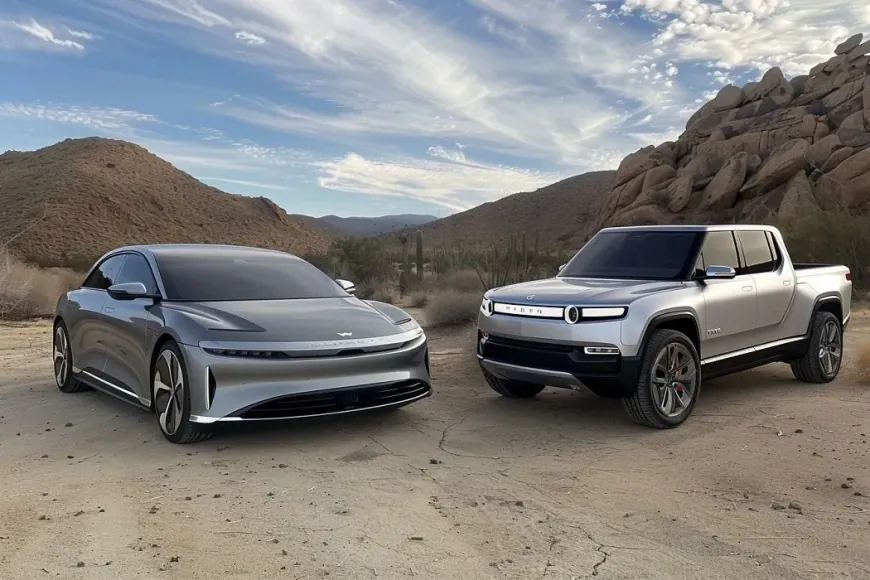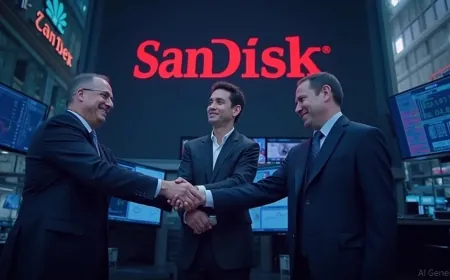Rivian vs Lucid: Best EV Stock to Buy in 2025
Rivian plans affordable EVs while Lucid focuses on luxury and Uber robotaxis. 2025 stock trends highlight their contrasting growth strategies.

Rivian Automotive and Lucid Group are among the most closely watched electric vehicle startups in the United States. Both have ambitions to follow in Tesla’s footsteps, but their strategies could not be more different.
Tesla became the world’s largest EV producer largely by focusing on two models, the Model 3 and Model Y. With prices below $50,000, these vehicles hit the range that most American buyers can afford. That combination of scale and accessibility helped Tesla grow quickly while funding investments in autonomous driving technology and future mobility concepts.
Rivian, which launched with premium trucks and SUVs, is now aiming for a wider market. The company plans to introduce three new vehicles starting under $50,000 in 2026. Production is reportedly on schedule, and the lower price point could help Rivian reach buyers who have found most EVs out of reach. On Wall Street, Rivian trades at roughly 3.7 times sales, well below Lucid’s multiple of 7.6.
Lucid continues to focus on luxury. Its Air sedan has drawn praise for range and design, but prices remain high. More affordable models are not expected until 2027 at the earliest. The company has also signed a deal with Uber to supply 20,000 vehicles for a future robotaxi fleet. Unlike Tesla, Lucid will not operate these vehicles, limiting the upside from this market.
The contrast is clear. Rivian is chasing volume and affordability. Lucid is relying on high-end buyers and partnerships for growth. Investors who prioritize near-term expansion may see Rivian as the more tangible option. Lucid’s strategy could succeed over the long term, but the results are uncertain and dependent on technology adoption and market conditions.
Rivian is preparing three new vehicles priced under $50,000 in 2026, aiming to reach a broader market segment and increase production volume. Lucid continues to focus on its high-end Air sedan and will supply 20,000 vehicles to Uber for a planned robotaxi fleet. These contrasting approaches are reflected in current stock valuations: Rivian trades at 3.7 times sales, while Lucid trades at 7.6 times, showing how investors are pricing near-term affordability versus luxury and partnership exposure.
| Feature / Metric | Rivian Automotive (RIVN) | Lucid Group (LCID) |
|---|---|---|
| Focus Segment | Affordable EVs (mass-market models in 2026) | Luxury EVs (high-end market, Air sedan) |
| Current Models | R1T Pickup, R1S SUV | Air Sedan |
| Planned Affordable Models | 3 new vehicles under $50,000 (2026) | Not expected until 2027 |
| Strategic Partnerships | Developing autonomous driving features | Supplying 20,000 vehicles to Uber for robotaxis |
| Stock Valuation (Price-to-Sales) | 3.7x | 7.6x |
| Market Capitalization | $7.5B | $12B |
| Revenue (2024 estimated) | $1.5B | $1.6B |
| Production Status | On schedule for 2026 launch | Limited affordable production plans |
| Investor Focus | Near-term volume growth, affordability | Long-term partnership and luxury market growth |
| Analyst Note | Expected to capture broader U.S. EV market | Exposure to autonomous mobility but limited volume impact |
| Share Price Trend (YTD 2025) | Slight recovery from early 2025 lows | Volatile, strong interest around Uber deal |
Also Read: The Future of EV Stocks: Challenges, Investments, and Market Impact






























































